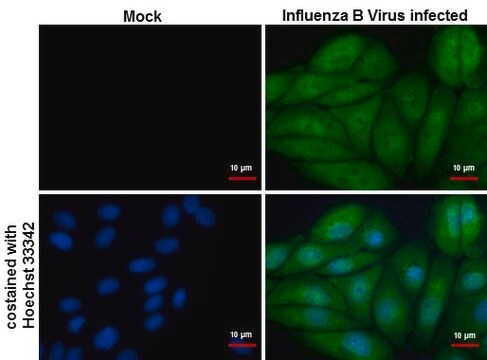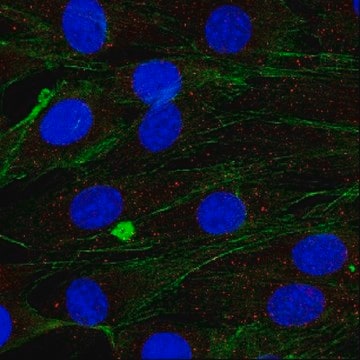推荐产品
生物源
rat
共軛
unconjugated
抗體表格
purified from hybridoma cell culture
抗體產品種類
primary antibodies
無性繁殖
Clone 6F10, monoclonal
形狀
buffered aqueous solution
分子量
~21 kDa
物種活性
mouse, monkey, canine, rat, human
包裝
antibody small pack of 25 μL
濃度
~1.0 mg/mL
技術
immunocytochemistry: suitable
western blot: 0.12-0.25 μg/mL using A549, HeLa, SH-SY5Y, COS7 or MDCK cell extracts
同型
IgG2b
UniProt登錄號
運輸包裝
dry ice
儲存溫度
−20°C
目標翻譯後修改
unmodified
基因資訊
human ... GLO1(2739)
mouse ... Glo1(109801)
rat ... Glo1(294320)
相关类别
一般說明
Monoclonal Anti-Glyoxalase I (rat IgG2b isotype) is derived from the hybridoma 6F10 produced by the fusion of mouse myeloma cells and splenocytes from rat immunized with a mouse Glyoxalase I fusion protein. The glyoxalase system, which consists of glyoxalase I (GLO1), glyoxalase II, and a catalytic amount of reduced glutathione (GSH), is important part of cellular metabolism. GLO1 appears to be ubiquitously expressed in all mammalian cells, suggesting its biological importance.
免疫原
mouse Glyoxalase I fusion protein
應用
Monoclonal Anti-Glyoxalase I antibody produced in rat has been used in immunoblotting. and immunocytochemistry.
生化/生理作用
The glyoxalase system plays a major role to detoxify α-ketoaldehydes, especially methylglyoxal (MG), that are endogenously formed as a by-product of the triosephosphate isomerase reaction during glycolysis. A member of this system, GLO1 catalyzes the isomerization of a hemithioacetal, comprised of a nonenzymatic adduct of MG and glutathione (GSH), to the corresponding α-d-hydroxyacid thioester and S-D-lactoylglutathione. Studies have suggested that GLO1 may be important for brain function since, GLO1 in the brain is involved in Alzheimer′s disease, autism, anxiety and the regulation of theta oscillations during sleep.
外觀
Solution in 0.01 M phosphate buffered saline, pH 7.4, containing 15 mM sodium azide
免責聲明
Unless otherwise stated in our catalog or other company documentation accompanying the product(s), our products are intended for research use only and are not to be used for any other purpose, which includes but is not limited to, unauthorized commercial uses, in vitro diagnostic uses, ex vivo or in vivo therapeutic uses or any type of consumption or application to humans or animals.
未找到合适的产品?
试试我们的产品选型工具.
儲存類別代碼
10 - Combustible liquids
閃點(°F)
Not applicable
閃點(°C)
Not applicable
Yusuke Nakadate et al.
Hybridoma (2005), 28(6), 447-450 (2009-12-23)
Glyoxalase I (GLO1) is a key enzyme that plays a role in the detoxification of methylglyoxal (MG), a toxic cellular metabolite produced during glycolysis. The present study reports on the preparation and properties of a monoclonal antibody (MAb) directed against
Tumor necrosis factor-induced modulation of glyoxalase I activities through phosphorylation by PKA results in cell death and is accompanied by the formation of a specific methylglyoxal-derived AGE
Van Herreweghe F, et al.
Proceedings of the National Academy of Sciences of the USA, 99(2), 949-954 (2002)
Glyoxalase 1 and glutathione reductase 1 regulate anxiety in mice
Hovatta I, et al
Nature, 438(7068), 662-662 (2005)
Deleterious Effect of Advanced CKD on Glyoxalase System Activity not Limited to Diabetes Aetiology
Pacal L, et al.
International Journal of Molecular Sciences, 19(5), 1517-1517 (2018)
Methylglyoxal: an emerging signaling molecule in plant abiotic stress responses and tolerance
Hoque TS, et al.
Frontiers in Plant Science, 7(20), 1341-1341 (2016)
我们的科学家团队拥有各种研究领域经验,包括生命科学、材料科学、化学合成、色谱、分析及许多其他领域.
联系技术服务部门







